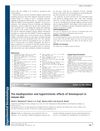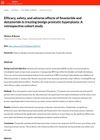 1 citations,
January 2020 in “Recent Research in Genetics and Genomics/Recent Research in Genetics and Genomics ”
1 citations,
January 2020 in “Recent Research in Genetics and Genomics/Recent Research in Genetics and Genomics ” High doses of Lepidium sativum seed extract are toxic and should be used with caution.
 18 citations,
October 2013 in “EFSA Journal”
18 citations,
October 2013 in “EFSA Journal” Coriander seed oil is safe for healthy adults at up to 600 mg per day.
 13 citations,
July 2019 in “Toxicology research”
13 citations,
July 2019 in “Toxicology research” Ethanamizuril is safe for rats at 20 mg/kg feed, but higher doses cause hair loss, organ changes, and liver, kidney, and lung damage.
 35 citations,
February 1994 in “Fundamental and applied toxicology”
35 citations,
February 1994 in “Fundamental and applied toxicology” High doses of finasteride cause cell growth and tumors in mice.
 20 citations,
September 2019 in “South African Journal of Botany”
20 citations,
September 2019 in “South African Journal of Botany” Teucrium polium extracts are non-toxic and effectively speed up wound healing.
 3 citations,
January 1994 in “Toxicological Sciences”
3 citations,
January 1994 in “Toxicological Sciences” Finasteride causes abnormal growth in male mice cells at high doses.
 9 citations,
December 2022 in “Phytomedicine”
9 citations,
December 2022 in “Phytomedicine” More high-quality research is needed to recommend flavonoids and saponins for clinical use.
 7 citations,
January 2015 in “Evidence-based Complementary and Alternative Medicine”
7 citations,
January 2015 in “Evidence-based Complementary and Alternative Medicine” The review suggests renaming two herbs to avoid confusion and recommends more research for safe use.
 59 citations,
January 2010 in “Pharmacognosy Reviews/Bioinformatics Trends/Pharmacognosy review”
59 citations,
January 2010 in “Pharmacognosy Reviews/Bioinformatics Trends/Pharmacognosy review” Semecarpus anacardium Linn. has many medicinal benefits.
 1 citations,
July 2023 in “F&S Reviews”
1 citations,
July 2023 in “F&S Reviews” Some common medications may harm male fertility by affecting hormones, sperm production, and sexual function.
 6 citations,
January 2013 in “Experimental dermatology”
6 citations,
January 2013 in “Experimental dermatology” Bimatoprost increases hair growth in mice without breaking down into other substances.
 September 2023 in “Food and chemical toxicology”
September 2023 in “Food and chemical toxicology” High doses of some selenium supplements caused liver and reproductive harm in rats.
 33 citations,
December 2015 in “Neuroendocrinology”
33 citations,
December 2015 in “Neuroendocrinology” Finasteride treatment changes brain steroid levels and receptors, affecting brain function even after stopping treatment.
 32 citations,
May 2010 in “Pharmacopsychiatry”
32 citations,
May 2010 in “Pharmacopsychiatry” Finasteride reduces new brain cells in male mice, possibly causing depression.
 71 citations,
January 2014 in “Journal of Proteome Research”
71 citations,
January 2014 in “Journal of Proteome Research” Women with PCOS have different levels of certain fats and proteins in their blood, which could help diagnose the condition.
 4 citations,
October 2022 in “Frontiers in public health”
4 citations,
October 2022 in “Frontiers in public health” Cadmium chloride pollution can cause skin disorders, speed up aging, and prevent hair growth.
 December 2022 in “The Indian journal of chest diseases & allied sciences”
December 2022 in “The Indian journal of chest diseases & allied sciences” Women with PCOS often have sleep problems, including sleep apnea, which are linked to obesity and depression.
 17 citations,
September 2020 in “Journal of Endocrinological Investigation”
17 citations,
September 2020 in “Journal of Endocrinological Investigation” Post-finasteride patients show changes in gut bacteria, possibly causing various symptoms.
 8 citations,
July 2019 in “Endocrine connections”
8 citations,
July 2019 in “Endocrine connections” Finasteride affects SRD5A2 gene pattern, possibly causing lasting side effects.
 5 citations,
January 2018 in “Skin Pharmacology and Physiology”
5 citations,
January 2018 in “Skin Pharmacology and Physiology” Curcuma aeruginosa extract lotion significantly reduces underarm hair growth.
1 citations,
May 2019 in “International Journal of Applied Pharmaceutics” Both hair tonic and gel with Angiopteris evecta extract effectively stimulate hair growth.
 December 2024 in “Zanco Journal of Medical Sciences”
December 2024 in “Zanco Journal of Medical Sciences” Finasteride and dutasteride are equally effective and safe for treating BPH.
 37 citations,
September 2018 in “Psychoneuroendocrinology”
37 citations,
September 2018 in “Psychoneuroendocrinology” Finasteride treatment in male rats causes long-lasting effects on depression-like behavior, brain cell growth, inflammation, and gut bacteria composition.
 14 citations,
October 2016 in “Psychoneuroendocrinology”
14 citations,
October 2016 in “Psychoneuroendocrinology” Finasteride affects brain processes related to neurotransmission and metabolism, potentially helping with neuropsychiatric conditions.
 10 citations,
September 2014 in “The Journal of Steroid Biochemistry and Molecular Biology”
10 citations,
September 2014 in “The Journal of Steroid Biochemistry and Molecular Biology” Allopregnanolone increases KCC2 expression in baby male rats' brains, while finasteride doesn't affect it.
 7 citations,
October 2017 in “Behavioural Pharmacology”
7 citations,
October 2017 in “Behavioural Pharmacology” Fluoxetine's effectiveness as an antidepressant in mice depends on a specific protein activity and a 5-minute pretest.
 58 citations,
April 2017 in “The Journal of Steroid Biochemistry and Molecular Biology”
58 citations,
April 2017 in “The Journal of Steroid Biochemistry and Molecular Biology” Post-finasteride patients show changed neuroactive steroid levels, possibly causing erectile dysfunction and depression.
 54 citations,
August 2005 in “Alcohol”
54 citations,
August 2005 in “Alcohol” Finasteride affects alcohol intake in male mice, possibly due to neurosteroids.
 53 citations,
January 2009 in “Journal of Investigative Dermatology”
53 citations,
January 2009 in “Journal of Investigative Dermatology” UVB radiation harms hair growth and health, causing cell death and other changes in human hair follicles.
 47 citations,
December 2002 in “Journal of Neurochemistry”
47 citations,
December 2002 in “Journal of Neurochemistry” Progesterone boosts alcohol's effect on brain, finasteride counters it.





























